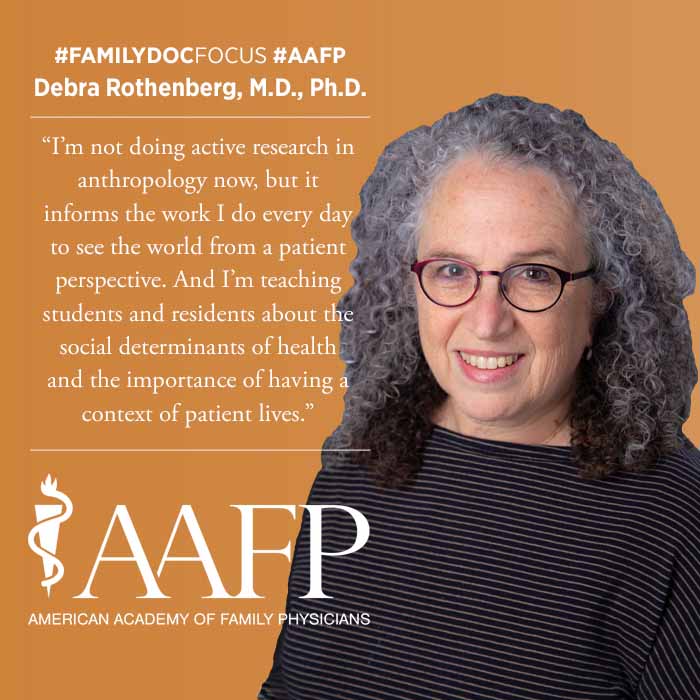FP Leads Residents in Care for Homeless Patients
November 18, 2019 1:04 pm David Mitchell – Debra Rothenberg, M.D., Ph.D., had no intention of becoming a doctor. After graduating from Cornell University with an undergraduate degree in social sciences, she served in the Peace Corps for more than two years, teaching nutrition classes to mothers attending well-baby visits at a rural clinic in Niger.
"I was smitten by the work," said Rothenberg, associate program director of the Maine Medical Center Family Medicine Residency Program in Portland and assistant clinical professor in the Department of Family Medicine at Tufts University School of Medicine. "I came back to the United States trying to figure out how to get more clinical and cross-cultural knowledge."
Rothenberg lacked the prerequisites needed to get into medical school, so she went back to school at Michigan State. While preparing for the Medical College Admission Test, she also did full-time graduate work in anthropology, eventually earning both a medical degree and a doctorate.
"Anthropology helped me keep things in perspective because I had one foot outside medicine," said Rothenberg, who returned to Niger for a 3 1/2-month study on mothers' understanding of malnutrition for her dissertation. "I'm not doing active research in anthropology now, but it informs the work I do every day to see the world from a patient perspective. And I'm teaching students and residents about the social determinants of health and the importance of having a context of patient lives."
The community medicine block of the Maine program requires residents to make nonclinical home visits to help them understand a patient's perspective.
"It informs what they do every day," Rothenberg said.
Now the residency is taking things a step further through the Maine Medical Center-Preble Street Learning Collaborative a partnership between the medical center and a community-based organization that serves a homeless population. The clinic is staffed by a full-time nurse practitioner and six care managers. Family medicine, psychiatry, internal medicine and emergency medicine residents see patients in roles ranging from yearlong continuity experiences to shorter block rotations. The PSLC also hosts education sessions for students on family medicine rotations at the Maine Track of Tufts University School of Medicine.
In 2014, a homeless clinic closed in Portland around the same time that the family medicine program had a Clinical Learning Environment Review by the Accreditation Council for Graduate Medical Education. The timing proved serendipitous.
"We did really well (on the CLER)," Rothenberg recalled, "but one of the comments we received was that we should have a better and more robust approach to stepping outside the walls of the hospital and approaching vulnerable populations."
The PSLC opened in January 2017 and treated more than 400 patients in its first year. It now has seen more than 1,500 patients walk through its doors. The collaborative's goals are to improve care coordination for people who are experiencing or are at risk of homelessness while engaging students and residents in learning about health disparities and best practices for homeless health care delivery. Through its culturally sensitive care and curriculum, it aims to demonstrate and evaluate the effectiveness of both health care and medical education that places importance on understanding social determinants of health.
Rothenberg, the PSLC's academic director, already has created and implemented curriculum related to SDOH, trauma-informed care and best practices for homeless care.
"We want to develop a better understanding of high ER utilizers as well as the long-term stayers in the hospital," Rothenberg said. "We want to serve the underserved and be part of the solution to health disparities."
Rothenberg is one of the AAFP's Health Equity Fellows this year. As part of her work, she will evaluate how well the collaborative is working for learners, patients and population health.
"There's a lot of good work that shows that when you give back, it helps prevents burnout," she said. "We're providing opportunities for learners to re-engage and commit to some of the altruistic reasons that motivated them to enter this profession in the first place."
